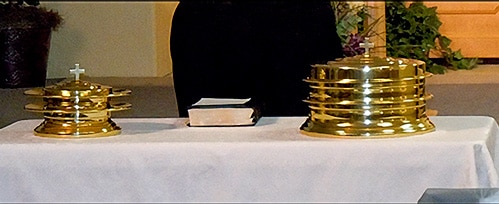Bible Question:
Should we take communion every Sunday?
Bible Answer:
Some churches take communion or the Lord’s Supper every Sunday. It is not uncommon for some to hold a special service before the main worship service for the purpose of celebrating the Lord’s Supper which is also called communion. They believe that Acts 20:7 reveals that the early church took communion every Sunday.

Meaning of Breaking Bread in Acts 20:7
Therefore, lets examine Acts 20:7. The verse tells us that Paul and others gathered on the first day of the week.
On the first day of the week, when we were gathered together to break bread, Paul began talking to them, intending to leave the next day, and he prolonged his message until midnight. Acts 20:7 (NASB)
The KJV, NASB and ESV translate the opening phrase of the verse as “On the first day of the week, when we were gathered together to break bread.” We italicized the word “when” because it is a key word in this verse. If we examine the NIV, HCSB and NTL we discover that they do not include the word “when.” The literal Greek does not include the the word “when” either. The meaning is that Paul and others gathered on some particular Sunday and broke bread. This is not a statement that they did this routinely week after week, Sunday after Sunday.
Meaning of Breaking Bread in Acts 2:42
Some also believe that Acts 2:42 teaches we should celebrate communion every Sunday.
They were continually devoting themselves to the apostles’ teaching and to fellowship, to the breaking of bread and to prayer. Acts 2:42 (NASB)
But this passage does not tell us how often they met together either. It simply says “they were continually . . .” We are not told if this was daily, every two or four days, weekly or how often. The message is they habitually met together.
Meaning of Breaking Bread in Luke 24:35
The key phrase to understanding what occurred in Acts 2:42 and 20:7 is to understand the meaning of “breaking bread” in Luke 24:35.
They began to relate their experiences on the road and how He was recognized by them in the breaking of the bread. Luke 24:35 (NASB)
In this verse we are told that Jesus and others were together during the “breaking of bread.” The meaning of the phrase “breaking of bread” is revealed in verses 29b-30. Verses 31-34 reveal what followed next.
. . . So He went in to stay with them. When He had reclined at the table with them, He took the bread and blessed it, and breaking it, He began giving it to them. Luke 24:29a-30 (NASB)
In verses 29b-30 we are told that Jesus and some men had “reclined at table.” That is, they had a meal together. In Christ’s day people ate a meal as they reclined at table. They did not sit at a table to eat. Here we are told that as they reclined at table Jesus prayed. Then He broke some bread and they ate. Later in verses 31-34, we are told that they got up from the table and traveled back to Jerusalem.
Then their eyes were opened and they recognized Him; and He vanished from their sight. They said to one another, “Were not our hearts burning within us while He was speaking to us on the road, while He was explaining the Scriptures to us?” And they got up that very hour and returned to Jerusalem, and found gathered together the eleven and those who were with them, saying, “The Lord has really risen and has appeared to Simon.” Luke 24:31-34 (NASB)
As the men returned to Jerusalem, they talked about their experience with Christ and referred to the “breaking of the bread” (v. 35). This reveals that the “breaking of the bread” does not refer to communion or the Lord’s Supper, but to dining together.
Conclusion:
The phrase “breaking bread” in Acts 2:42 and 20:7 refers to a shared meal and not to communion or the Lord’s Supper. Therefore, there is no biblical mandate or requirement to have communion every week or every Sunday. The real issue is not a rule or law as to how often Christians should celebrate communion. The important issue is what does the Lord’s Supper mean to the Christian. The important issue is not how often we celebrate communion but how meaningful is communion or the Lord’s Supper to the worshiping Christian? What is important to you? How meaningful is Christ’s death for the forgiveness of your sins? Imagine celebrating communion as a duty or ritual with a lack of interest or boredom? Would God be pleased? It is important that we celebrate communion or the Lord’s Supper from the heart.